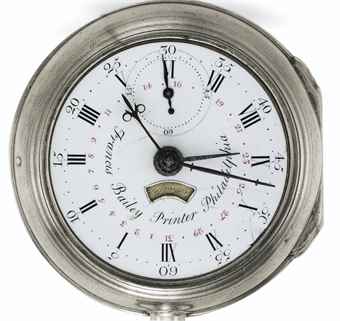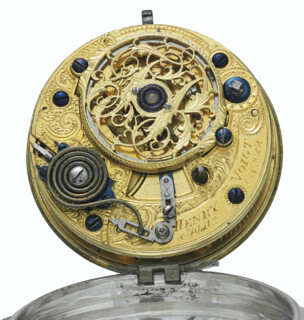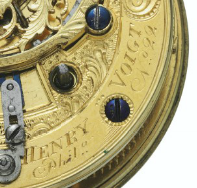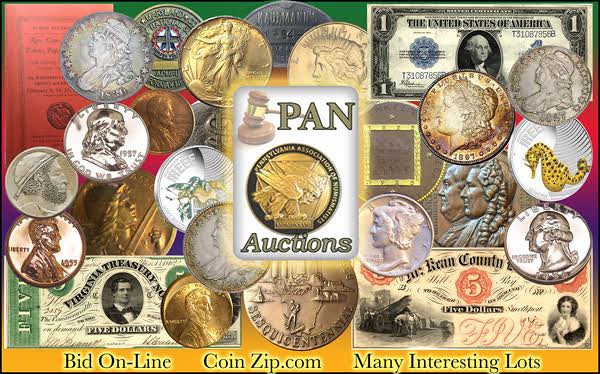
PREV ARTICLE
NEXT ARTICLE
FULL ISSUE
PREV FULL ISSUE
CHRISTIES TO SELL WATCH BY COINER HENRY VOIGT
Kay Olson Freeman pointed out a lot in Christie’s upcoming New York auction of a very rare watch by Henry Voigt, who later became the
first coiner of the U.S. Mint. Thanks! Here's an excerpt from the description (Sale 11898, Lot 32). -Editor
Rarely in the world today does an object surface that redefines scholarship in an entire field. Such is the case with the discovery of the Henry Voight-Francis Bailey pocket watch. The presently offered watch was made by Henry Voight, chosen later by George Washington as chief coiner of the first US Mint and especially made for the first printer of the Articles of Confederation, Francis Bailey. As impressive as the unparalleled technical merits of this unique watch, no less impressive are the life and times of the man by whom it was originally ordered. They bear witness to the age of the founding fathers. This watch literally rewrites the history of American horology and touches upon every element of the birth of a nation. The heart of this incredible story connects us directly to masterful figures of early American history. However, perhaps even more prominent is its powerful representation of the American ingenuity to solve problems - whether political, scientific, or horological - in a creative, original, and bold way
Henry Voight
"Mr Voight is a Plain Dutchman who fears no man and will always speak his sentiments which has given offense to some of the Members of our Co., and some of them have effected to have a contemptible an opinion of his Philosophic abilities. It is true he is not a man of Letters nor mathematical Knowledge but for my own part I would depend on him more than a Franklin, a [David] Rittenhouse, an Ellicot, a [John] Nancarrow, and Matlack [Timothy Matlock], all combined, as he is a man of superior Mechanical abilities, and Very considerable Natural Philosophy; and as we have many of the first Geniuses in our Co., perhaps nearly equal to those I have mentioned, it is Certain that he has pointed out more defects than them all, and pointed out ways to remedy those defects, when consternation sat silent in every breast for the disaster." Francis Bailey
The watch has a wide estimate: $200,000 – $400,000. Be sure to read the details of the watch description - its technical details are
impressive. An amazing object, to have survived the centuries and provide a tangible link to the early days of our country. What a great
prize for a collector.
This lot description spells his name as "Voight", but most (though not all) references in numismatic literature spell it "Voigt". I've been guilty of using both variations at different times in The E-Sylum. The name is spelled "Voigt" in the watch, which was presumably engraved by Henry himself. So I went with "Voigt" for the headline and comments of this article (but left the Christie's text as-is). -Editor To read the complete lot description (be sure to click on Lot Notes), see:
Wayne Homren, Editor The Numismatic Bibliomania Society is a non-profit organization promoting numismatic literature. See our web site at coinbooks.org. To submit items for publication in The E-Sylum, write to the Editor at this address: whomren@gmail.com To subscribe go to: https://my.binhost.com/lists/listinfo/esylum All Rights Reserved. NBS Home Page Contact the NBS webmaster 
|



